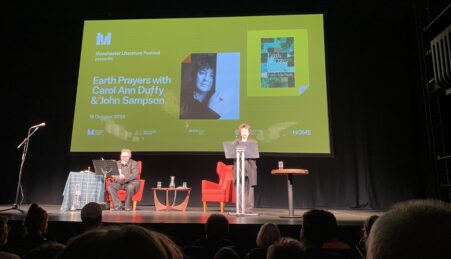
Humanity Hallows Issue 6 Out Now
Pick up your copy on campus or read online
By Bridget Taylor
Poet and Manchester Met Senior Lecturer in American Literature Nikolai Duffy read from his new poetry collection Up The Creek at No. 70 Oxford St recently. The collection is described as ‘a book about what happens when all the paddles have been sold to offshore investment funds’, and it paints a cynical portrait of the capitalist society in which we are currently living.
Two poems in particular stood out for emphasising the absurdity of office language and practices which have now become a significant part of our world. In ‘Business Bingo’, two office workers compete to score points when they hear the clichéd management speak of terms and sayings like ‘core competency’, ‘peel the onion’, ‘synergise’ and ‘let’s talk that’. Beneath the surface humour, however, the effect of the litany of these stock phrases is to reveal how meaningless those words have always been; yet in a business context they are taken seriously and ascribed meaning.
Similarly, ‘Daily Scrum’ highlights the ritualistic machismo of the weekly team meeting. Seen through the eyes of a new recruit, who aspires to be ‘scrum master’, the poem shows how the narrator is soon moulded by that environment into the perfect ‘team player’ – understanding that the purpose of the meeting is ‘not so much status update as team synchronisation’ designed to ‘centralise the wellbeing of the team’s ability’. As with the previous poem, the language used gives it a slightly sinister edge. If language is supposed to help us demystify the world, then we experience a slight slippage – like missing a stair – when we realise this language has no content, and so in fact pulls in the opposite direction, working to obscure rather than clarify.
Poet and Lecturer in Creative writing at the University of Chester Ian Seed also read an extract from his short story, ‘Italian Lessons’. In stark contrast to the management speak, his prose was observational and precise, picking up and focusing on minute details, such as a grasshopper in the opening scene by a lake, or a woman’s red hair dye in a later classroom scene. The overall effect was one of clarity, but combined with the story’s oppressive heat and sense of detachment, the narrator feels – as an English traveller to Italy – that he knows and observes such details because he has experienced these places too many times before. It gave a feeling of a world very narrowly defined, without much scope or freedom. A member of the audience described it as a “vivid realist world evoked by crisp language and clear descriptions.”
Duffy’s writing was also close to reportage, and so challenged what one might typically expect from a poetry reading. Most of the collection is written as ‘prose poetry’. For Duffy, this is because, “prose is a more level playing field. It’s more relevant to the contemporary world” and it challenges our understanding of what poetry is or can be: “Writing in prose is more irreverent, it raises questions about the nature of poetry, and questions its traditions, blurring the boundary between story, poetry and expectation.”
This prosaic style contributed to a lightness of tone throughout, though this was often contradicted by the subject matter, such as a poem about the million-strong march against the government’s proposed invasion of Iraq in 2003, told through lines like ‘queues for public transport were considerably worse than usual – and we were glad.’ The contrast had the effect of exposing the disconnection between a language that is often divorced from reality and the darker reality that still exists behind it. This was also highlighted through commenting that the protestors ‘used words like democracy, community, people power, solidarity’ – exposing the strangeness and unfamiliarity of those words to us in our society. The prosaic style also emphasised the sadness of the end result of that march – the government went to war anyway – and, by simply stating this, it had a more profound effect than underscoring the emotion would have done.
Duffy commented on this mixture of light and dark, saying, “The collection is a kind of contemporary absurdity. Ultimately our hands are tied – you still have to pay your rent, and engage with a valueless society. The narrator is deeply entrenched in that world and complicit with it, they are not suggesting any alternative. But it is holding up a mirror.”
Though the poetry was enjoyable, and No. 70 Oxford St, home to the Manchester Writing School, as warm and welcoming a setting as ever, it did seem to end on a note of futility – that resistance to the system is impossible. Though Duffy did suggest, “There is power in the adolescent knee jerk reaction, of saying what you’re not meant to, and sticking two fingers up.”






Leave a reply